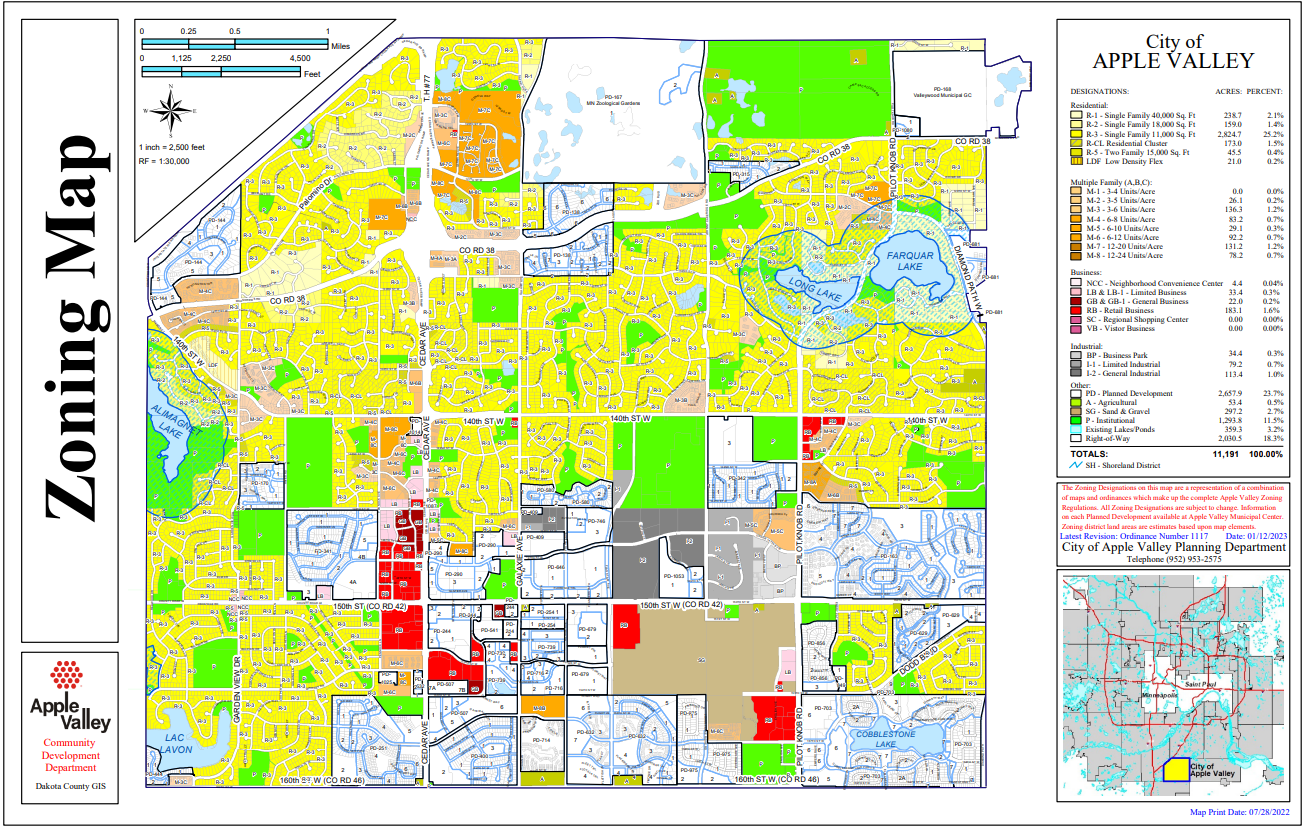New Minnesota Legislation Threatens Local Control Over Housing
APPLE VALLEY, MINNESOTA - During the Apple Valley, Minnesota City Council Meeting that was held on Thursday, March 14, 2024, City Administrator Tom Lawell spoke about some bills working through the Minnesota legislature that were designed as an attempt to fix the State of Minnesota's concerns on the lack of housing and affordable housing. Some local communities across the state, including the City of Apple Valley's City Council, want to make their residents aware these bills might attempt to fix these issues at the expense of local control over land use development, which could have a greater impact on our local communities.
Below are the four bills introduced during the latest legislature session to address housing issues across Minnesota. Since their introduction, several of these bills have been combined into one, which we will discuss below.
HF 4009 (Kraft- St. Louis Park)/SF 3964 (Mitchell - Woodbury) Missing Middle Housing Bill
According to Administrator Lawell, if this bill were to pass, the original bill would replace any city zoning and land use authority that local municipal governments have created with a more rigid statewide framework that would remove the public's ability to provide input in any residential development processes in their city. It would also supersede any long-range comprehensive plans local communities have already developed, resulting in these communities having to redevelop them. Mr. Lawell also worries that this bill doesn't consider the impacts of densification on local community infrastructure. Changes to these long-term plans and the likely need to upgrade infrastructure would be at the expense of the local taxpayer.
SF 3980 (Pha - Brooklyn Park) Multifamily Residential Developments in Cities
This bill would impact local community parking restrictions and the predetermined aesthetic of a community and introduce additional requirements for multifamily residential developments (MRDs). This would include allowing MRDs to be permitted in any zoning district not previously zoned as industrial or agricultural, for example, in areas zoned as business or commercial.
SF 3303 (Lucero - St. Michael) Limiting Regulations on Certain Residential Development
This bill could also broadly limit design standards and aesthetic requirements and prohibit cities from having a required minimum square footage or floor area ratio.
SF 3080 (Draheim - Madison Lake) Legalize Affordable House Act
This bill would require mandatory upzoning of single-family lots.
The 1st Engrossment
As previously mentioned, these four bills have since been combined into one, otherwise known as an Engrossment or the 1st Engrossment, now called SF 1370 (Port—Burnsville). Under this new bill, Mr. Lawell states that single-family zoning would be eliminated statewide to accommodate what they now call "Middle Housing." We will speak more about this 1st Engrossment, what Middle Housing is, and the new outline of this legislation below.
Middle Housing
Mr. Lawell reports that under this legislation, cities would have to choose between at least six different housing types, including duplexes, triplexes, fourplexes, fiveplexes, sixplexes, stacked flats, courtyard apartments, and cottage-style housing to be allowed in place of single-family housing for both new and old single-family zoned lots. In other words, neighborhoods originally zoned to only have single-family homes would no longer exist. If someone wanted to tear down their single-family home and turn it into any of the previously named housing styles, they would have the right and ability to do so.
Additionally, this bill would allow accessory dwelling units, both attached and detached, to be built on every residential lot. Cities would also have to allow at least two housing units to be built on a single residential lot, and if a lot is within a half-mile of a major transit stop, at least four units would be allowed to be built on a single residential lot. Mr. Lawell pointed out that with the Cedar Avenue transit line, that would apply to residents along that corridor. If proposed developments were going to be all-electric and energy efficient, affordable, or both, then the minimum per residential lot allowed would increase to three to eight units.
The bill then states that even with all these additional units being added to a single residential lot, cities could not require off-street parking for units located within one-half mile of a major transit location, and only ONE off-street parking spot would be allowed for those outside a half-mile from a transit stop. In other words, if multiple people live in one residence and all can drive, only one can park their car off the street.
Under this bill, cities must also reduce the minimum lot sizes to around 4,000 square feet for all six housing styles. According to Mr. Lawell, the City of Apple's average minimum lot sizes are around 11,000 square feet.
Multifamily Housing
This bill defines multifamily housing as buildings with eight or more units. Under this new proposed bill, multifamily housing would be allowed in any mixed-use, multifamily, or commercial-zoned property. Cities would no longer be able to restrict the height of said apartment buildings within a said commercial zone if the residential building is less than the tallest commercial or residential building within a quarter mile or the maximum height allowed by code, whichever is greater. Regarding the City of Apple Valley, Mr. Lawell says the tallest commercial building is the Wings Headquarters, which stands about 100 feet tall. Under this new bill, an apartment building could be built as tall as the Wings Headquarters within a property zoned for commercial use. If that proposed multifamily development were affordable, an additional 35 feet would be allowed. Turning our commercial areas into multifamily residential properties would decrease our city's ability to bring jobs to the local community and potentially decrease the tax revenue from those businesses.
This bill suggests an alternative density plan requiring cities to adopt zoning controls before June 30, 2025, and allow residential construction to increase a city's density by more than 100% in single-family zones. However, according to Mr. Lawell, there isn't any real guidance on that part of the bill yet.
The Concerns
If this legislation were to be adopted, it would greatly restrict the local government's zoning and land authority, reduce lot sizes, force more units onto smaller lot sizes, eliminate aesthetic standards set by local communities, reduce parking requirements, and require cities to accept Accessory Dwelling Units on all residential lots regardless of their size. No limits are also mentioned in the current legislation for how many units a community will be forced to add.
Additionally, this legislation would greatly impact the City of Apple Valley's land development plans, which the 2040 Comprehensive Plan is currently guiding. According to Mr. Lawell, this plan is a 10-year cycle that takes multiple years to put together and covers all the utilities, services, partners, businesses, school districts, and community input. It is then presented to our Metropolitan Council for approval. So, this legislation would impact the City of Apple Valley and its development plans and the surrounding communities in the Metro that are part of the Metropolitan Council.
These impacts would also extend to the City's infrastructure, including our roads, water mains, sewer lines, and stormwater management systems, all sized to support the current land development plans per the 2040 Comprehensive Plan. If this legislation were to pass, improvements would likely need to be made to the infrastructure to handle the increased density, which would cost the City more money. This cost is likely to be passed on to the residents through increased taxes since this legislation, as it stands, does not have funding built into it to cover those costs.
There would also be added impacts on our environment, as more structures and less green space would increase stormwater runoff and water usage across the City. This would have a direct impact on our City's water conservation efforts.
The zoning map used to make development decisions for the City of Apple Valley through the 2040 Comprehensive plan. By: City of Apple Valley
In the map above, you will see the areas designated as single-family housing in yellow (R-1 to R-3) and those designed as commercial in red. This legislation would impact both those regions, which cover a large portion of the City of Apple Valley. For a more detailed look at this map, click the "City of Apple Valley" text in the image description above.
What Can Residents Do?
Mr. Lawell and every City of Apple Valley's City Council member disapproved of this legislation. As a resident of the City of Apple Valley or any of the other surrounding communities in the State of Minnesota that this legislation would directly impact, it is recommended you reach out to your local representatives and tell them to oppose this legislation and that you would like to see them adopt the resolution opposing this legislation.
Specifically for City of Apple Valley residents, your three representatives are Senator Erin Maye Quad, Representative Robert Bierman, and Representative John Huot. We have directly linked each of these representatives' websites to their names if you want to contact them about your views on this legislation.
Here is the link to the Apple Valley City Council Meeting from March 14, 2024. The segment on this legislation begins at 12:51 and goes until 57:17, which includes the thoughts and feedback from each council member.
Written by: Will Wight

